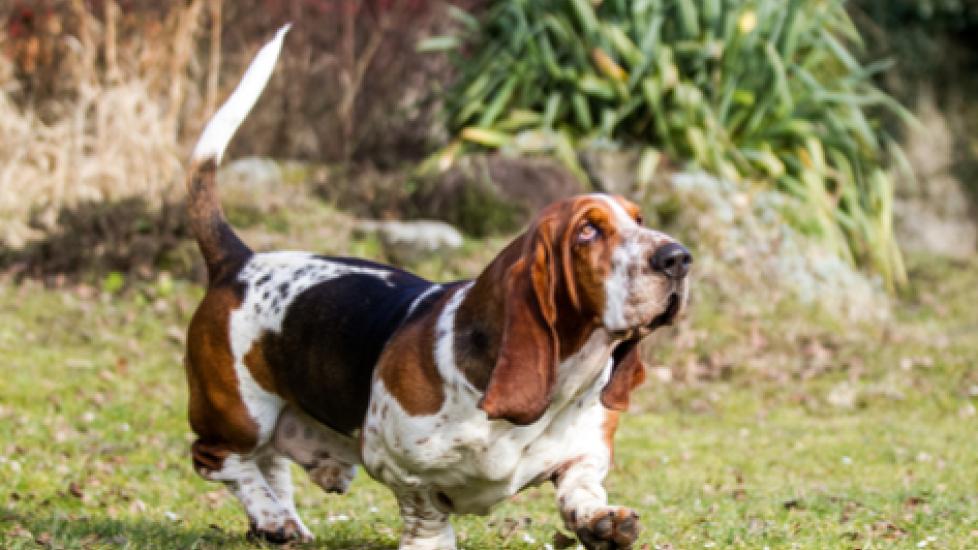Dog Breeds That Suffer from Eyelid Problems
Katy Nelson, DVM
Over the past 100 years, breed confirmation of many of our favorite dog breeds has changed dramatically, and not always for the better. Dachsunds have become shorter and Bull Terrier’s faces have become more sloped, as has the rear end of German Shepherds. Bulldogs have become more severely brachycephalic, and Shar-Peis have become wrinklier.
These changes have many health implications. One major category of breed-related health issues that has grown over the past decades is eyelid issues. Sagging droopy eyes (called ectropion) and lids turned painfully inward (called entropion) have become much more exaggerated in many breeds of dogs due to changes in desired breed traits. Other issues like eyelid masses, extra eyelashes that grow toward the cornea (dystichia), and excessively large eye openings (macropalpebral fissures) are not all genetic in origin, but have also become more prevalent.
In fact, most dogs with even mild to moderate entropion or ectropion suffer for a lifetime with either chronic irritation, frequent infections, “dry eye” (because the tear ducts in the lids are nowhere near the eyes), or corneal ulceration (from eyes that are too dry or eyelid hairs perpetually rubbing on the delicate cornea).
Depending on their severity, these eyelid issues can cause pain (typical) and even eye loss (not as rarely as you might think). The upshot of bad lid conformation is that plastic surgery (called blepharoplasty) is required to correct these defects—and not so inexpensively, either.
Some breeds are more prone to each of these disorders than others:
Ectropion in Dogs
Hound Breeds
(Basset Hound, Bloodhound) These breeds are bred to have a droopy look about them with sad eyes, long ears, and floppy skin. This “desirable” confirmation breeds for excessively large eye openings, resulting in ectropion. Surgical correction is often required.
Spaniel Breeds
(Clumber, English and American Cockers, Springer) These dogs are bred to have wrinkly faces with droopy eyes and ears, often with much excess skin throughout the body. The droopiness of the skin leads to ectropion, often requiring surgical correction.
Bully Breeds
(Boxer, Bulldog, Bull Terrier) These dogs are bred to have a stocky, muscular build with brachycephalic (squished-face) conformation, in the case of Boxers and Bulldogs, or a rounded and elongated skull, in the case of Bull Terriers. These abnormal head shapes can lead to outward rolling of the eyelids and may require surgical correction.
Labrador Retrievers, Gordon Setters, and Shih-Tzus are also prone to ectropion.
Entropion in Dogs
Terrier Breeds
(American Staffordshire, Yorkies, Staffordshire Bull) Terrier breeds vary greatly in size and conformation, but this category of pups are highly susceptible to entropion, which may require surgical correction.
Sporting Breeds
(Chesapeake Bay Retriever, Flat-Coated Retriever, Golden Retriever, Gordon Setter, Irish Setter, Labrador Retriever) Much like terrier breeds, the sporting breeds vary greatly in size and conformation, but they are known to form entropion and should be checked any time they are displaying reddened eyes, increased tearing or ocular discharge.
Bully Breeds
(Boxers, Bulldogs, French Bulldogs) With their flat faces, wrinkles, and worried looks, these dogs have captured the hearts of Americans. But the traits that we find so “adorable” have led to many breathing problems, skin and joint problems, and entropion. Like many other breeds, surgical correction is often required.
Spaniels
(Clumber, English and American Cockers, English Springer, English Toy and Tibetan) Spaniel breeds are predisposed to both entropion and ectropion. The loose skin on the faces and macropalpebral fissures can causes the eyelids to roll inward (or outward), leading to irritation and infection. Surgery to tighten the skin around the eyes can be helpful to decrease rolling of the skin.
Toy Breeds
(Pekingese, Pomeranians, Pugs, Japanese Chins, Shih Tzus, Poodles) With such a wide range of conformations of these breeds, it is difficult to pinpoint the reason why they are so prone to entropion. However, if they develop red, irritated eyes, increased tearing, or ocular discharge, they should be seen by their veterinarian to rule out entropion.
Akitas, Dalmations, Old English Sheepdogs, Rottweilers, Siberian Huskies, Viszlas, and Weimeraners are also prone to entropion.
Some dogs can suffer from both ectropion and entropion, such as Great Danes, Mastiff breeds, Saint Bernards, Bernese Mountain Dogs, Newfoundlands, and Great Pyrenees.
Treating Eyelid Problems in Dogs
Any time your dog is showing increased tearing, redness of the eyes, goopy discharge in the corners of his eyes, or excessively blinking, have him evaluated by your veterinarian immediately. The eyes are extraordinarily delicate organs, and quick treatment is often necessary to avoid long-term complications.
Read more: 8 Common Eye Problems in Dogs
Help us make PetMD better
Was this article helpful?
